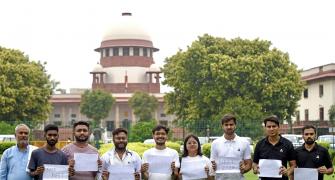Karnataka has the highest number of medical seats in the country at 11,745, of which 3,750 seats were in government institutions and 7,995 seats were in private colleges.

The Karnataka assembly on Thursday passed a resolution to scrap the National Eligibility-cum-Entrance Test (NEET), becoming the third state after Tamil Nadu and West Bengal to ask the Centre to exempt it from the national-level medical entrance test.
'This House hereby unanimously resolves to urge the Centre that the NEET exam system which severely affects the medical education of poor rural students, makes schooling redundant and deprives the rights of the state government to admit students in the state government medical colleges; it should be abolished,' the resolution stated.
It urged the Centre to immediately exempt Karnataka from this examination and to provide medical admission based on marks obtained in the Common Entrance Test conducted by the state government.
Tamil Nadu and West Bengal have also asked for marks scored in states' own medical entrance tests to be taken as benchmark for admissions in medical colleges, rather than NEET.
Meanwhile, Bahujan Samaj Party chief Mayawati too on Thursday demanded the scrapping of NEET and reinstatement of the old system of medical admissions.
Speaking on whether states can voluntarily leave NEET and start admission via state medical exams, a government official said, on the condition of anonymity, that under the NMC Act and UGC guidelines, NEET is the only mandatory all-India exam to secure medical admission in the country.
Karnataka's move comes after the medical entrance exam was rocked by allegations of paper leak.
While NEET has been a contentious issue for states since its inception in 2010, the southern states have been more vociferous in their opposition to a unified, all-India exam.
The major points of contention were differences in syllabus between state medical exams and NEET, which would be a disadvantage for students and amending regulations for medical admissions, making NEET the single entrance exam across India for MBBS and BDS courses.
States such as Tamil Nadu, Karnataka and Telangana have alleged that such an exam would take away the autonomy from states to provide medical education in their respective state medical colleges.
According to data shared by the ministry of health and family welfare, Karnataka had the highest number of medical seats in the country in the academic year 2023-2024 at 11,745, of which 3,750 seats were in government institutions and 7,995 seats were in private colleges.
It was followed by Tamil Nadu at 11,650 seats, Maharashtra at 10,845 seats, Uttar Pradesh at 9,908 seats and Telangana at 8,490 seats.
The same data suggests that southern states account for more than a third of all medical seats in India, at around 39 per cent, but the merit lists can only be prepared on the basis of NEET-UG results.
Under the National Medical Commission (NMC) Act 2019, institutions are prohibited from conducting their own entrance exams, and admission is based on the All India Rank (AIR) secured in NEET-UG.
The NMC oversees counselling sessions, where seats are allocated based on merit and candidate preferences, for 15 per cent of state seats, central institutes, and deemed universities.
Counselling for the remaining 85 per cent state quota seats and private colleges is managed by respective state medical boards, making their own merit lists using NEET-UG scores.
Feature Presentation: Ashish Narsale/Rediff.com










